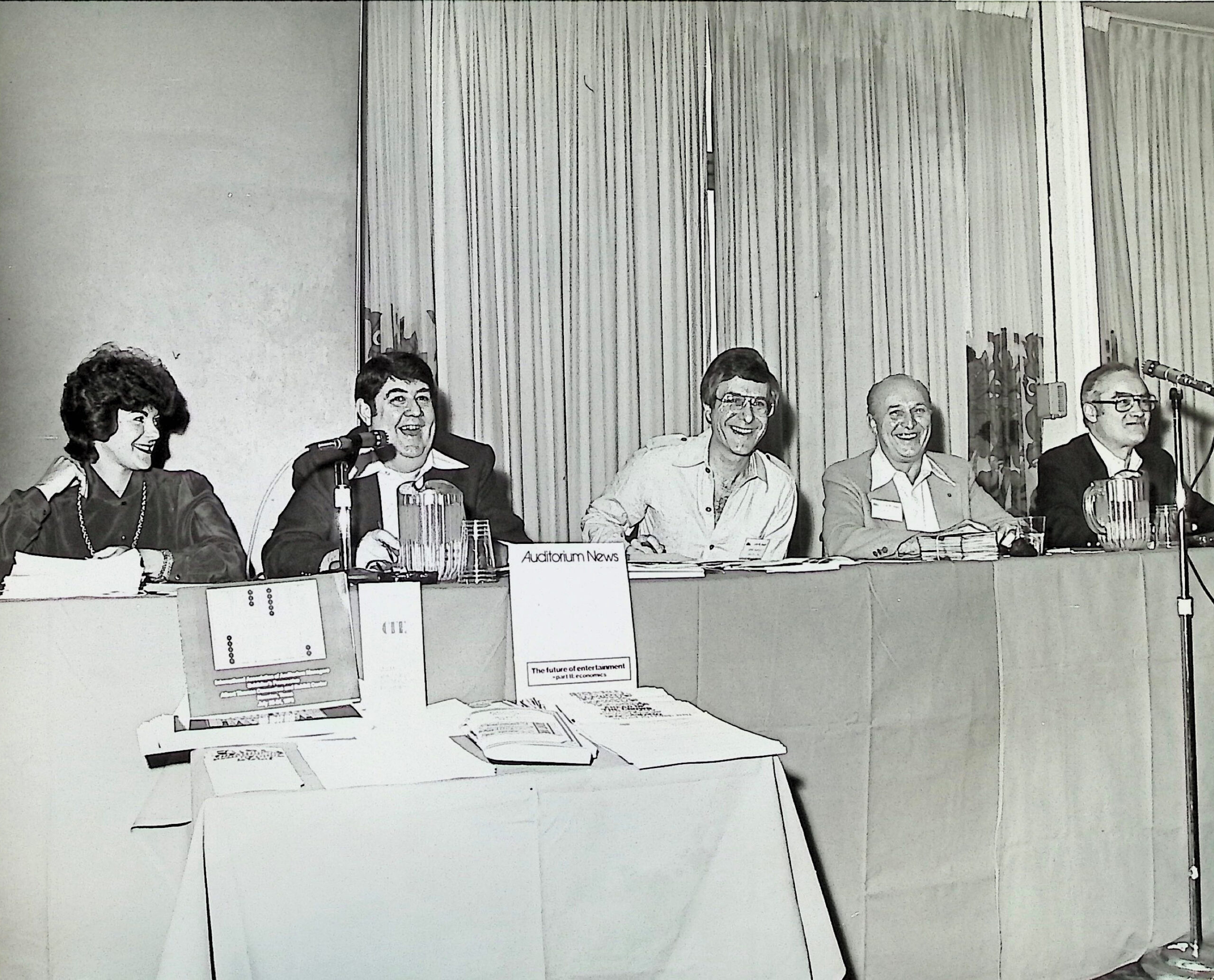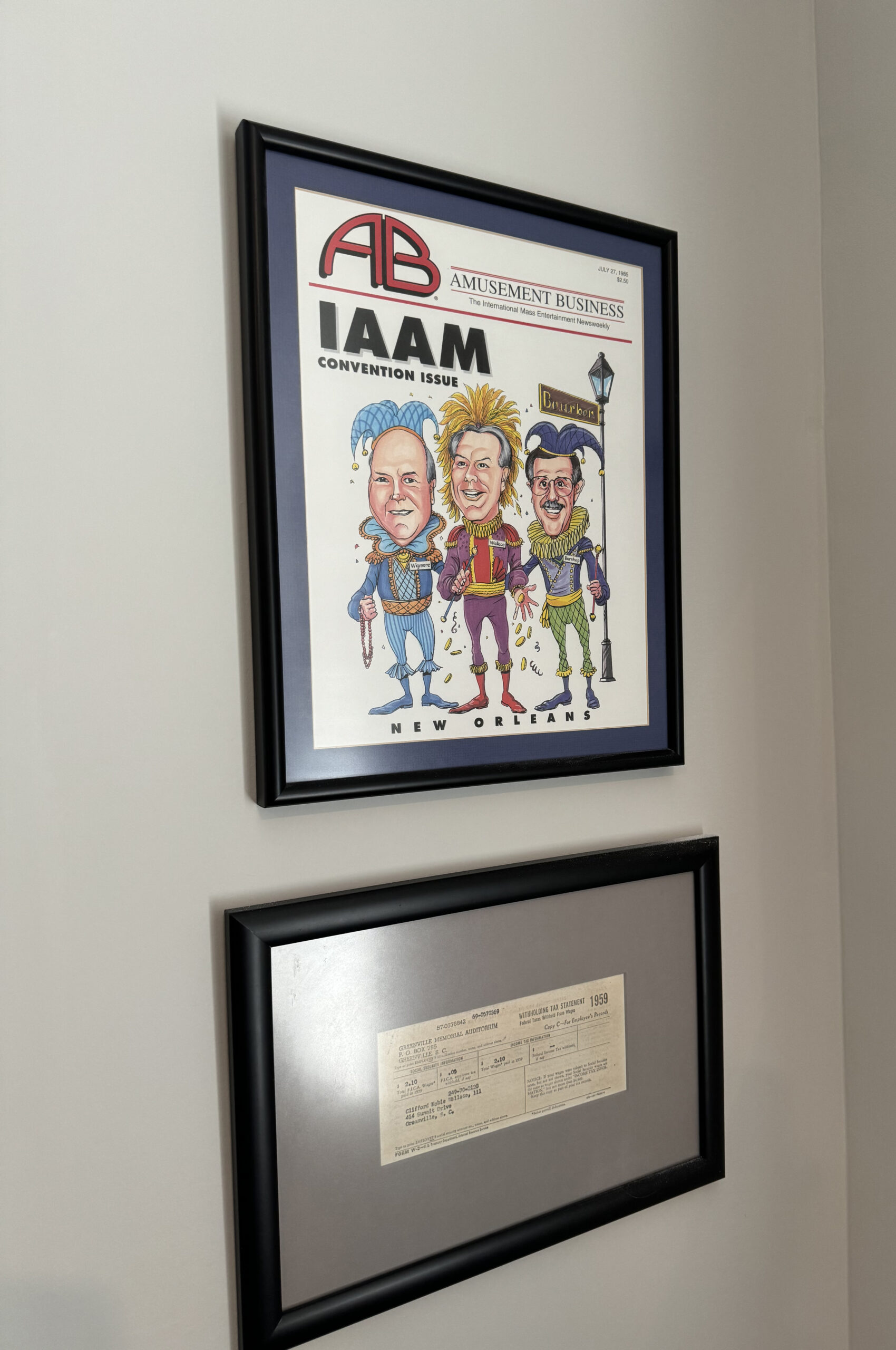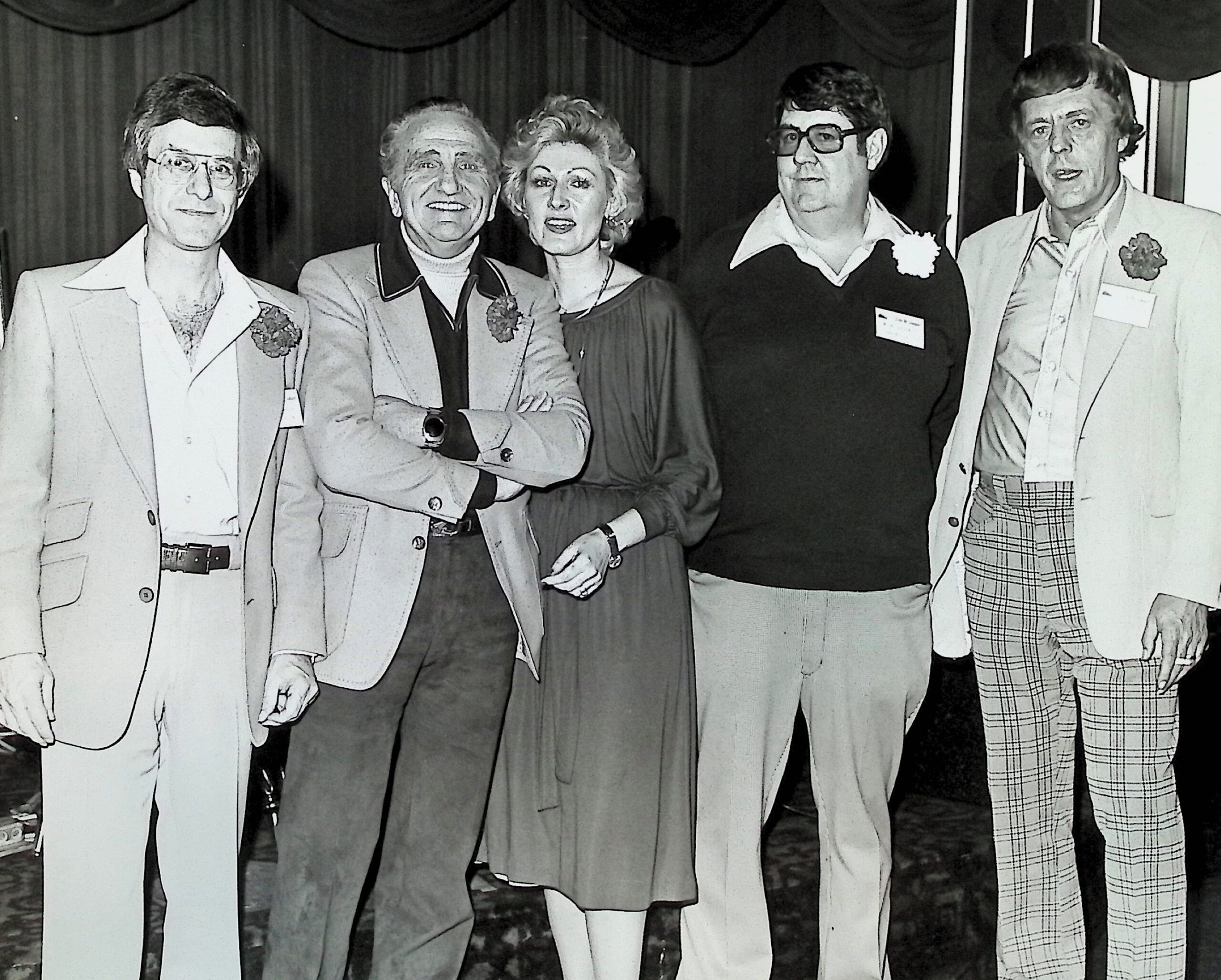Jerry Barshop of the Dallas Convention Center, past IAVM president and Charles A. McElravy Award winner, passed away June 14 at the age of 96.

Jerry Barshop, center, holds court at an IAVM meeting.
He is best known as the man who put Dallas on the convention destination map, having started working for that city when public assembly was nothing but a 10,000-seat arena and 50,000 sq.ft. of exhibit space, noted Frank Poe, who worked with Barshop in Dallas. By the time Barshop retired in 1992, the Dallas Convention Center could boast one million square feet of column-free space and was host to most major conventions.
The “confidence that Dallas city government had in Jerry” impressed Cliff Wallace, CVE, who followed Barshop as president of IAVM. “His responsibilities exceeded what most of us were doing at our venues, and he was very modest about that as if we should all be ready to pitch in and help out our cities, especially if it could enhance our venues. He was ethical, fair and his goal was simply what was right, best and above board.”
Born March 17, 1928, Jerry Melvin Barshop was a third-generation Dallasite, with the sensibilities of a person from a large family that lost everything during the Great Depression. “The man was the provider. He wanted to make sure my brother and I were never hungry, that we never suffered what he suffered at an early age,” recalls his daughter, Celia Barshop, who is a current member of IAVM and Managing Director, Morton H. Meyerson Symphony Center for the Dallas Symphony Association.
Both his son, Bruce, and Celia worked for Ticketmaster. Bruce Barshop pursued the concert business before going into law and moving to the West Coast. Celia stuck with the city of Dallas and has spent her career in the event business, usually working for nonprofits that run city-owned buildings.
Barshop encouraged his daughter to enter the business he loved. “Dad always said I was a great planner, and I really like people, and he thought this would be a great industry to be in – but only if I enjoyed it,” Celia remembered. She didn’t start working for the city until her dad retired in 1992, after which he was likely to attend any event she worked and offer his advice.
Barshop served Dallas for 40-plus years, ascending to the role of Director of Convention & Event Services. His leadership in the building and growth of iconic Dallas landmarks like Reunion Arena, the Dallas Convention Center, Farmers Market, WRR Radio, and Union Station leave an indelible mark on the city he cherished and the millions who enjoy those venues.

Incoming officers of IAVM in 1985, as caricatured for the cover of Amusement Business, include Ron Wigmore, Cliff Wallace and Jerry Barshop.
He also left his mark on the industry and the association he loved. He served in various roles in IAVM (IAAM at the time) and was instrumental in decisions like moving from private management of the association handled by a Chicago firm to an in-house executive director, recalls Poe, also a past president of IAVM and currently executive director of the Georgia World Congress Center, Atlanta.
Barshop was a staunch advocate for expanding IAVM membership beyond the top two positions in a venue. “He actively encouraged us to get involved,” Poe recalls. “He would tell us, there’s a lot of learning you can do and not just in meetings. Of even more value in the long-term is the network you develop.”
Barshop received his IAVM length-of-service award at the annual convention in Detroit-Windsor in 1975. A member of District 6, Barshop received his 10-year pin. He received his CVE in 1980, along with only one other Certified Venue Executive, Tom Minter, CVE. He was elected IAVM president in 1983-84 and was awarded the Charles A. McElravy Award for outstanding contributions to the association and the industry in 1988.
He was also a mentor to many future leaders of IAVM.
According to Poe: “I had the honor of working under Jerry as a part-time employee starting in 1969, at a time in my life when my focus was on earning a degree and working to pay my way through school. Little did I know at that time my work at the Dallas Memorial Auditorium would guide me toward a career in public assembly management. I only knew Jerry at the time as one of the ‘big bosses.’
“When he and Jack Beckman offered me a full-time position as a payroll/accounts payable clerk, I was still clueless as to Jerry’s intentions for my career. Fast forward to today, Jerry’s mentoring handprint is reflective all over my career. When he retired and I was offered the opportunity to follow in his footsteps, I knew it would be a daunting task. Each day from that time till now, Jerry’s influence upon me as a professional in this industry, an industry he loved so dearly, has made me work hard every day to not disappoint him. Jerry was truly a one-of-kind GIANT in our industry.”
Cliff Wallace, Senior Executive Advisor, Shenyang (China) New World Expo, served on the board of IAVM for several years with Barshop and then followed him as President (now Chair) of IAVM. “I learned so much from him being relatively young to even be in the industry, much less moving through the chairs to lead such an Association. He helped me greatly in the journey,” Wallace said.
“Jerry’s temperament, patience and drive to move IAVM forward were impressive. He was kind and gentle and liked to mediate complex issues quickly to resolve in simplistic common-sense fashion.”
Carol Wallace, CVE, president and CEO, San Diego Theatres and another past president of IAVM, was similarly impacted by Barshop. She entered this business because she had to walk through his Dallas Convention Center to get to her other job and decided, this looks interesting.
Of Barshop, she wrote: “Jerry was not only an industry legend and icon but also my personal mentor who profoundly influenced my life and career. For 40 years, he guided me and many others, leading the way with his visionary approach to venue management. Jerry’s commitment to inclusivity was groundbreaking. He was one of the first leaders to bring people of color into the venue management industry, tirelessly advocating for diversity and creating countless opportunities for mentorship and professional growth. His efforts ensured that voices from all backgrounds were heard and valued, leaving an enduring legacy that continues to shape our industry.”
The times were different, but still very similar, in the venue management world. While promoting his city as a convention destination, Barshop was also protecting and promoting an entire industry. He made some headlines when the International Society for Krishna Consciousness sued to be able to solicit and proselytize at a medical convention inside the Dallas Convention Center. The court sided with the city of Dallas in a May 5, 1978 ruling. Barshop had to testify. He was not the only venue manager embroiled in such controversies during those antiwar years when many tested the boundaries and venue managers worked to protect the image of their cities and the boundaries needed for their clientele, Poe recalled. “There was a different level of scrutiny back then. Sometimes, people even protested artists because they believed they were inappropriate for people to hear.”
At his funeral service in Dallas June 17, many remembered the impact he’s had on their lives. Celia shared that Jack Beckman told a story even she hadn’t heard, about the time he was hired to manage Reunion Arena. Barshop and his boss had flown to Corpus Christi to interview Beckman after he finished working a concert. A riot broke out at the concert and Beckman arrived late and soaking wet, apologizing for his appearance to his future bosses. “Well, you’re here now. What will be will be,” Barshop drawled in his Texas accent.
Carol Wallace had a similar experience with the unflappable, always pleasant Jerry Barshop. Wallace expressed her interest in learning about venue design and construction. Barshop was leading one of the many expansion projects at the Dallas Convention Center. “He invited me to an early morning breakfast meeting with the architects and others involved in the design process so that I could observe. I had worked a late-night concert and did not arrive home until 1 a.m. and then had to double back downtown for a 6 a.m. breakfast. I went because I really wanted to learn.

Jerry Barshop, left, with Lou Owen, unknown woman, Bill Luther and Dean Justice.
“I attended the meeting; nobody in the room looked like me. The meeting started, we had breakfast and after breakfast …I fell asleep. Jerry nudged me and I excused myself and returned to the office. When Jerry arrived at the office later, I quipped, “Just tell me I didn’t snore!” I was so embarrassed and did not want to attend any future meetings. But Jerry insisted that I needed to attend. He said we all have crazy things happen in our careers, but you just don’t let it deter you. You get back in the ring! So, I went back. As time wore on and I became familiar with the team members one of the friendly teases was that ‘if you didn’t keep the meeting moving, Carol’s going to fall asleep!’”
Jerry Barshop left his mark on the city of Dallas, the venue industry and his immediate family as one of the best. Carol Wallace was brought into the industry by Barshop and Poe. “Having two men like that who brought me in as the first person of color in the administrative office, not in housekeeping, at the Dallas Convention Center and then supporting me and mentoring me through the industry, I have to say, was a blessing.”
Celia revealed her dad loved listening to classical music in his downtime. He would say he didn’t understand it very well, but it caused him to think because it was so complex. During the rock and roll years at Reunion Arena he found another love – Led Zeppelin.
“He described Led Zeppelin the same way, saying ‘the songs are so good, and you have to think about the melody and it’s very complex,’” Celia said.
And when he listened, he listened loud, so loud it would set off the break-in alarm in his home because the windows vibrated so violently. Celia would get the back-up call from the security company because she lived nearby. Jerry wouldn’t hear the alarm because the music was so loud. “I could hear it when I pulled into the driveway,” Celia recalled. “I’d call back and say false alarm, he’s okay.” She never said it was just Led Zeppelin.
Barshop was also a serious family man and supported fully by his wife Wauscel who was regularly with him at district and national meetings of IAVM, as were Bruce and Celia, Cliff Wallace noted.
“Dad never took a vacation. Our vacation was the IAVM conference. There were spouses’ programs and kids’ programs. I met and stayed friends with Roy Saunders’ kids, the Mancuso kids from Omaha. I have some really fond memories. The closing lunch with RBBB that the kids could go to was a big-to-do,” Celia recalled.
For family and friends, the main lesson learned from Jerry Barshop was to be a servant leader. And he taught that “it doesn’t matter what your job title is. You do whatever it takes to get ready for an event,” Celia added. “Being a servant-leader just seemed effortless with Dad; it was who he was at work and how he was in his personal life.”
Barshop was predeceased by his parents, his brother and his cherished wife of 68 years, Wauscel LaRue. He is survived by his children, Bruce and Celia, and their families, including six grandchildren and six great-grandchildren, whom he held dear.
